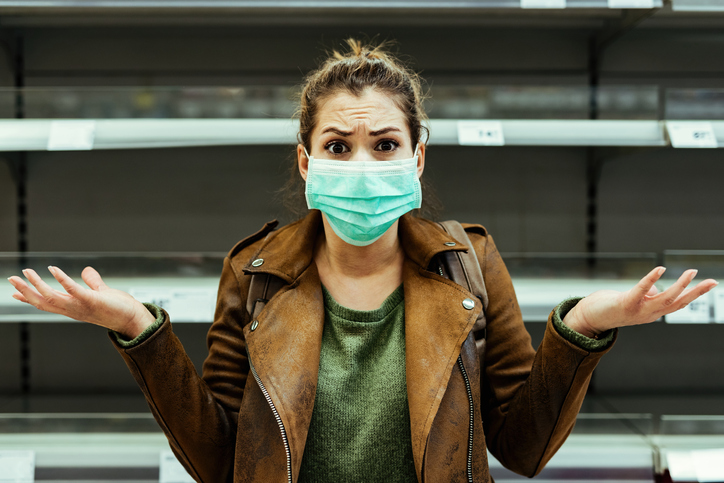The medical journal JAMA Pediatrics pulled an article describing lab measurements that showed masks exposed children to unsafe levels of CO2, suggesting masks could be unsafe for children.
The article recommended policymakers “weigh the hard evidence” before ordering children to mask up.
“Following publication, numerous scientific issues were raised regarding the study methodology, including concerns about the applicability of the device used for assessment of carbon dioxide levels in this study setting, and whether the measurements obtained accurately represented carbon dioxide content in inhaled air, as well as issues related to the validity of the study conclusions.”
Weeks after the retraction, in a separate action on July 27, the Centers for Disease Control and Prevention (CDC) revised its recommendation on masks by saying fully vaccinated individuals should wear masks in certain indoor situations.
Delta Change
CDC Director Rochelle Walensky said the Delta variant of the virus prompted the change.
“When we examine the rare breakthrough infections and we look at the amount of virus in those people, it is pretty similar to the amount of virus in unvaccinated people,” Walensky said at a briefing. “Unlike the alpha variant that we had back in May where we didn’t believe that if you were vaccinated, you could transmit further, this is different now with the Delta variant.”
The agency also reaffirmed its recommendation of universal masking in schools regardless of vaccination status.
Not Immune to Confusion
On May 15, the CDC said masks and social distancing were no longer necessary for people who have been fully immunized. It’s difficult to reconcile the new call for masks with the push for vaccination, says Marilyn Singleton, M.D., J.D., a board-certified anesthesiologist and former president of the Association of American Physicians and Surgeons.
“If the vaccine does not work, then why get the shot?” Singleton asked. “The problem: the vaccine is not really a vaccine in the true sense of the word. Vaccines prevent infection. The COVID-19 shot only promises to reduce symptoms should you get infected.”
In Israel, 50 percent of new COVID cases are among people who received the vaccine, Singleton says.
“Further, a worldwide study showed the antibodies are already fading in those who got vaccinated in January with the Pfizer vaccines,” Singleton said. “In the United States, deaths have been reported from post-vaccination infections.”
‘Bombarded with Conflicting Information’
The CDC and Dr. Anthony Fauci, President Joe Biden’s chief medical advisor on COVID-19, have flip-flopped several times on the need for masks. The push for vaccines has been consistent, by contrast.
“We have been bombarded with conflicting information since the pandemic started,” Singleton said. “Dr. Fauci and company have never had the accountability and backbone to say that they were mistaken and they will try to follow the science in the future.
“Moreover, when you have such blatant hypocrisy by people like California’s Gov. ‘Lockdown’ Newsom, who parties in full view without a mask and sends his son to a mask-less camp while telling us we must mask up, the average Joe will ignore whatever he has to say,” Singleton said.
Journal Cancel Culture
This is not the first time JAMA has retracted an article or statement that involved a contentious subject.
JAMA asked its deputy editor to resign in February after he said on a podcast and mentioned in a tweet, “structural racism is an unfortunate term to describe a very real problem.” JAMA editor-in-chief Howard Bauchner, M.D. resigned in the face of heat from the controversy, stating he was “profoundly disappointed” in himself for “lapses.”
Other journals have likewise been subjected to political conflict and retractions. Thirteen days after an article in the New England Journal of Medicine stated “wearing a mask outside health care facilities offers little if any, protection from infection,” the authors wrote a clarification. One author told Health Care News, “There was no pressure. My colleagues and I are very pro-mask.”
Mask Confusion
The mask issue has become political and no longer scientific, says Paul E. Alexander, Ph.D., a health research methodologist who has been researching and writing about the global pandemic response with Howard C. Tenenbaum, D.D.S., a dentist and professor of periodontology at the University of Toronto.
“From the beginning, Dr. Fauci and other public health experts, including the television medical experts, told us that masks are ineffective for stopping the spread of a viral pandemic,” Alexander said. “Fauci was actually following the science then.
“Several studies showed that during influenza seasons, masks could not contain spread and masked or unmasked groups had the same incidence of disease,” Alexander said. “Fauci indicates that he changed his position on masking due to emerging new data, to explain his apparent change of mind. Indeed, the scientific data did change, with new studies being published. But the new studies reconfirmed that [masks’] ineffectiveness applies to SARS CoV-2 as well.”
Alexander and Tenenbaum have concluded the accumulated data show masks are ineffective and even dangerous.
“This then leads us to question why Dr. Fauci still changed his advice towards masking,” Alexander said. “This remains a mystery, particularly given even more recent back-and-forth advisories relating to masking that have arrived on an almost weekly basis.”
AnneMarie Schieber (amschieber@icloud.com) is the managing editor of Health Care News.
This article was updated on August 12, 2021.
